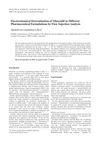 19 citations,
March 1990 in “Journal of Cardiovascular Pharmacology”
19 citations,
March 1990 in “Journal of Cardiovascular Pharmacology” Minoxidil affects rat fluid dynamics, altering pressure and circulation, improving blood flow and hair growth.
 19 citations,
September 1989 in “Journal of The American Academy of Dermatology”
19 citations,
September 1989 in “Journal of The American Academy of Dermatology” Minoxidil treatment may cause hair loss.
19 citations,
October 1988 in “Clinics in dermatology” Retinoids might help hair grow and improve hair loss treatments.
 19 citations,
March 1987 in “International Journal of Dermatology”
19 citations,
March 1987 in “International Journal of Dermatology” A drug called cimetidine can help treat hair loss in women by blocking androgen receptors. However, it's not the first choice and needs more research.
 19 citations,
January 1987 in “Dermatology”
19 citations,
January 1987 in “Dermatology” Minoxidil slows down skin cell growth and may help treat scars and skin conditions.
 19 citations,
December 1985 in “Journal of The American Academy of Dermatology”
19 citations,
December 1985 in “Journal of The American Academy of Dermatology” Minoxidil can cause scalp comedones and acne.
 19 citations,
July 1983 in “American Journal of Kidney Diseases”
19 citations,
July 1983 in “American Journal of Kidney Diseases” Minoxidil lowers blood pressure in kids with kidney issues, but use carefully due to side effects.
 19 citations,
May 1979 in “Archives of internal medicine”
19 citations,
May 1979 in “Archives of internal medicine” Minoxidil effectively lowers blood pressure and initially increases plasma renin activity without raising aldosterone levels.
18 citations,
January 2019 in “International Journal of Trichology” PRP therapy works better than minoxidil for treating hair loss.
 18 citations,
February 2017 in “Journal of Cosmetic Dermatology”
18 citations,
February 2017 in “Journal of Cosmetic Dermatology” Mesotherapy for hair loss can sometimes cause more hair loss and scarring.
 18 citations,
April 2016 in “Toxicological Research”
18 citations,
April 2016 in “Toxicological Research” Lavender oil significantly promotes hair growth in mice.
 18 citations,
November 2014 in “Journal of Agricultural and Food Chemistry”
18 citations,
November 2014 in “Journal of Agricultural and Food Chemistry” Brazilian propolis was found to speed up hair growth in mice by increasing the growth of skin cells that form hair.
 18 citations,
March 2014 in “Drug Development and Industrial Pharmacy”
18 citations,
March 2014 in “Drug Development and Industrial Pharmacy” New gel formulas without ethanol and propylene glycol, containing a minoxidil-methyl-β-cyclodextrin complex, have been created for treating hair loss.
 18 citations,
February 2014 in “PubMed”
18 citations,
February 2014 in “PubMed” Androgenetic alopecia is a common hair loss condition caused by testosterone effects on hair follicles, leading to thinner, shorter, and less pigmented hair, diagnosed using scalp dermoscopy and treated with topical minoxidil, antiandrogen agents, and 5-alpha reductase inhibitors.
 18 citations,
January 2013 in “Postepy Dermatologii I Alergologii”
18 citations,
January 2013 in “Postepy Dermatologii I Alergologii” Puberty often causes skin issues like acne and excessive sweating, and treatments require patience as results may vary.
 18 citations,
August 2012 in “Journal of The American Academy of Dermatology”
18 citations,
August 2012 in “Journal of The American Academy of Dermatology” Estrogen therapy helped regrow hair in a bald man.
 18 citations,
January 2006 in “Analytical Sciences”
18 citations,
January 2006 in “Analytical Sciences” Method accurately measures minoxidil concentration in medicines.
 18 citations,
March 2003 in “PubMed”
18 citations,
March 2003 in “PubMed” Hair loss in women can be due to abnormal hair growth cycles or damaged hair follicles, with the most common type being androgenetic alopecia; treatment varies by cause, and the psychological impact is significant.
 18 citations,
December 1996 in “Seminars in Cutaneous Medicine and Surgery”
18 citations,
December 1996 in “Seminars in Cutaneous Medicine and Surgery” Chemotherapy and cytokine therapy can cause various skin reactions, including hair loss and hypersensitivity.
 18 citations,
January 1992 in “The Journal of emergency medicine”
18 citations,
January 1992 in “The Journal of emergency medicine” Minoxidil overdose caused heart changes, treated with stomach wash, charcoal, and IV fluids.
 18 citations,
April 1986 in “International Journal of Cosmetic Science”
18 citations,
April 1986 in “International Journal of Cosmetic Science” Minoxidil promotes hair regrowth in early baldness stages and prevents baldness in non-bald scalps.
 18 citations,
March 1985 in “Journal of The American Academy of Dermatology”
18 citations,
March 1985 in “Journal of The American Academy of Dermatology” Cocaine use can cause a blistering skin disease.
 18 citations,
March 1984 in “BMJ”
18 citations,
March 1984 in “BMJ” Minoxidil helps hair regrowth in alopecia, but more research needed.
18 citations,
January 1976 in “Drugs” New treatments improved blood pressure control in patients with resistant hypertension.
 18 citations,
July 1975 in “Clinical Pharmacology & Therapeutics”
18 citations,
July 1975 in “Clinical Pharmacology & Therapeutics” Oral minoxidil effectively controls blood pressure quickly and safely.
17 citations,
November 2021 in “Journal of Cosmetic Dermatology” Combination therapies for androgenetic alopecia work best but can have significant side effects and costs.
 17 citations,
June 2019 in “Cellular signalling”
17 citations,
June 2019 in “Cellular signalling” Minoxidil helps protect and rebuild elastic fibers in arteries, improving artery function, especially in older females.
 17 citations,
June 2016 in “Australasian Journal of Dermatology”
17 citations,
June 2016 in “Australasian Journal of Dermatology” Treatment with dutasteride, minoxidil, and artificial hair transplantation improved appearance but caused folliculitis.
 17 citations,
October 2015 in “Medicine and Pharmacy Reports”
17 citations,
October 2015 in “Medicine and Pharmacy Reports” Animal models are crucial for learning about hair loss and finding treatments.
 17 citations,
May 2015 in “Nanomedicine: Nanotechnology, Biology and Medicine”
17 citations,
May 2015 in “Nanomedicine: Nanotechnology, Biology and Medicine” Scientists created tiny particles loaded with a hair growth drug, minoxidil, that specifically target hair follicles and skin cells to potentially improve hair growth.


























